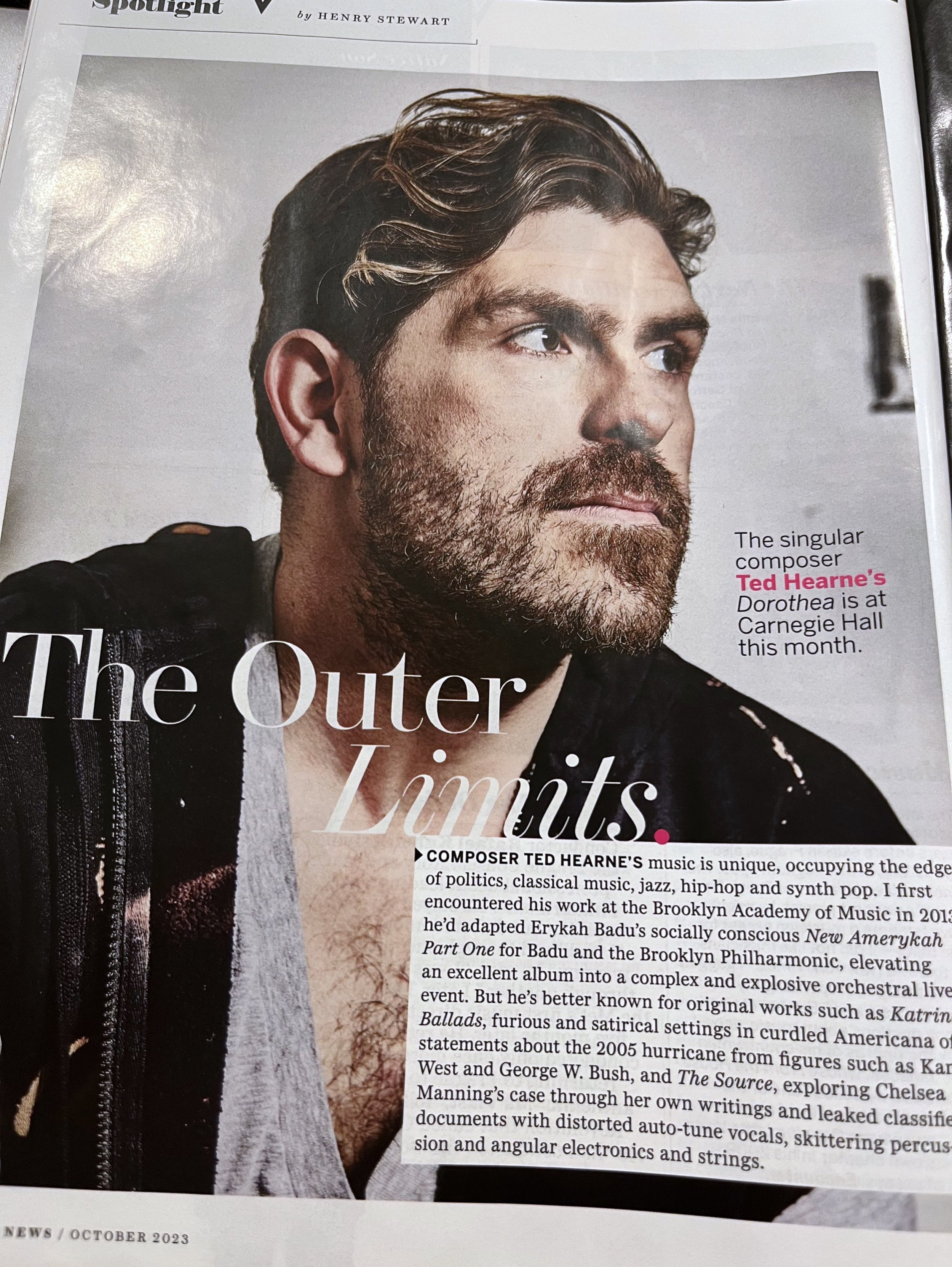Opera News Oct 2023 Spotlight by Henry Stewart
COMPOSER TED HEARNE'S music is unique, occupying the edge of politics, classical music, jazz, hip-hop and synth pop. I first encountered his work at the Brooklyn Academy of Music in 2013: he'd adapted Erykah Badu's socially conscious New Amerykah Part One for Badu and the Brooklyn Philharmonic, elevating an excellent album into a complex and explosive orchestral live event. But he's better known for original works such as Katrina Ballads, furious and satirical settings in curdled Americana of statements about the 2005 hurricane from figures such as Kanye West and George W. Bush, and The Source, exploring Chelsea Manning's case through her own writings and leaked classified documents with distorted auto-tune vocals, skittering percussion and angular electronics and strings.
His latest project is Dorothea, an evolving cycle with texts by poet Dorothea Lasky — whom Hearne calls “Dottie" — that has its New York premiere this month at Carnegie Hall. It evolved from an earlier work, In Your Mouth, that had many of the same songs in different arrangements; he thinks he may add a few more before the Carnegie performance.
Dorothea has become less a piece than a project—a band, adding to the set list as the various musicians continue to perform. As recorded in 2021 at UCLA, where he teaches, Dorothea was a program of goth-y, glam-rock art song with Hearne as frontman, sharing vocal duties with Eliza Bagg; he wore blue eyeshadow and a vibrant gemstone necklace. "I wear makeup a lot!" he says by Zoom in June from Los Angeles. "I'm not sure if I'm going to wear makeup [at Carnegie Hall. Every time Dottie goes out in public, she seems to have bright eye makeup on, and when I was writing this piece, the first time I met her in person, she brought a lot of makeup for me. So, for me, makeup is a part of it.”
Now forty-one, Hearne got his start in music singing for twelve years in the Chicago Children's Choir. Founded in the 1950s by a Unitarian minister to integrate races and classes through music, the choir is embedded with a social-justice philosophy. "I always think about that as the most important formative musical experience for me," he says, adding, "The programming of music was about creating an intercultural conversation. For me, that became a central tenet of music itself and was why I wanted to be a musician."
When he got to the Manhattan School of Music as an undergrad, he realized other people saw it differently. "That's not necessarily what musicians connect to," he says, laughing. "That's not what music means to people, necessarily."
His works grapple with thorny, hot-button issues. Place, from 2018, looks at gentrification and race through the poetry of Saul Williams and a sort of deconstructed R&B; Sound from the Bench, inspired by Jena Osman's poetry about corporate personhood in the U.S. legal system, sets texts from landmark Supreme Court cases and ventriloquism textbooks. ("I'm usually setting text that was never originally meant to be aestheticized at all." he says.)
Dorothea seems like a shift, but he disagrees. "I think that all art is political. Her poems aren't often integrating super politicized topics in the same way, but no, I think that a lot of her work is political in many ways. One way is that as a woman, I think her use of power language—and also sort of gaudy imagery, and sometimes she'll adopt almost like an emo thing—I think these are all political choices, in terms of how she's presenting herself in her own emotional landscape.
"There's a political element, too, in the most basic sense-[my] not being a woman and singing the words of a woman," he adds. "But in all the other senses too, in terms of, just, we are different people, and I still am exploring, I don't know, how singing these words helps me explore a different side of my identity and my gender identity and my gender presentation. I think this was a huge part of my process writing the piece.”
He discovered Lasky's work through a friend, who recommended it. "I instantly fell in love with her poetry," he says. "The way that it's so raw and cutting. The arrangement's really perfect, and then occasionally there'll be, like, a really special word or a twist that recontextualizes everything.”
Over the summer, the choral group The Crossing gave the premiere of another Hearne work, Farming, at King's Oak Fo in Bucks County, PA—"my first pгоduction on a farm," he says it's a large, complex work inspire by Dr. Sarah Taber's podcast about agriculture and labor and their intersections with concepts such as capitalism and redlining. The texts put into conversation the colonist William Penn and the billionaire Jeff Bezos, broken up by advertisements for UberEats.
When we spoke, Hearne was set to record the work the same month, and he was still thinking about which labels might be right for it. "It doesn't sound like classical music to me at all." he says.

